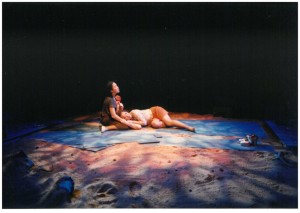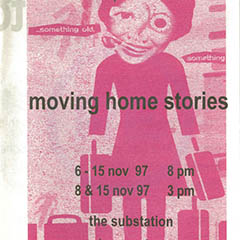Haresh Sharma’s Sea was first staged in 1997 as part of a double-bill entitled Moving Home Stories. Following on from Land (also written by Sharma), Sea depicted the whimsical conversation between two sisters, the elder Fong Su Fen and her younger sibling, Fong Su Fang, also called Tarcy. Fen and Tarcy were first played by Serene Chen and Zelda Tatiana Ng respectively, to much critical acclaim. The pair were directed by Kok Heng Leun.
Here’s how theatre reviewers responded to the 1997 production of Sea:
[Sea] is a story about two sisters who take a boat trip. Each has her problems. Younger sister Tarcy leads a bohemian lifestyle while married elder sister Fen is more proper.
Some parts of the play stray into “magic realism”. Said Kok [Heng Leun]: “The story is rooted in realism but there is a magic feel to it that makes people wonder if what is unfolding is real or whether it is just a dream.”Source: Watch this play, then pay what you want by Selina Lum. In The Straits Times (1 Nov 1997), http://tinyurl.com/q8tdnnv
Sea, then, was a pleasant surprise: two strong performances from Serene Chen and Zelda Tatiana Ng as sisters on a boat in the ocean. The relationship resonates beautifully…
Chen performs, true to her name, with a gentle and quiet truth, and subtlety. She plays the older sister struggling with a troubled marriage, a dying husband, and her desire for children.
As the younger “very garish” Tarcy, Ng lights up the evening. With flair and enthusiasm, she creates a complex character of depth and sensuality. At one point, she balances a banana in the sand and fondles it with her mouth in hope of arousing her sister’s wrath.
The audience was mesmerised. When she applies the same careful and patient licking to her sister’s arm, finally resting her head in the elder’s lap, the connection between these two reverberates with the ancient bond of sisters. If only there had been more such moments.Source: Bountiful sea and dry land by Elizabeth A. Kaiden. In The Straits Times (12 Nov 1997), http://tinyurl.com/oou8dj3
Sea, directed by co-author Kok, adopted a more lyrical, ethereal approach to issues of home and belonging in a production crammed with symbolic gestures and props and carried along by dialogue and voice-overs which embrace the rhythmic and poetic power of language. Kok uses his insider’s take on the text to draw two full characters in Su Fen (Serene Chan [sic]) and Su Fang (Zelda Tatiana Ng).
Su Fang’s gaudy, vampish behaviour is foiled beautifully by the vulnerable naivety of her sister Su Fen. Kok creates tension between the two corners of the stage in which the sisters remain just long enough to make their meeting in the middle a welcome union and the rhythmic pace to Sea allows an undulating ocean to guide the ups and downs of the sisters’ emotions.Source: Tap your roots on Land and at Sea by Ben Munroe. In The Business Times (11 Nov 1997), http://tinyurl.com/psemch3
^Back to top
In a decade when artistic boundaries were being drawn and contested, Sea courted some controversy when the production was slapped with an R(A) rating after opening night. Audience members below the age of 18 had to be refunded half the ticket price since they were not allowed to watch the second play of the double-bill.
Recently in a TNS’ double-bill production (“Moving Home Stories”), the second play, Sea, had a scene where a character ate a banana in a suggestive manner. Despite the recommendation from an NAC official to censor the scene, we decided not to as we felt it was artistically justified. The NAC reported the matter to PELU [Public Entertainment Licenseing Unit] even before there was any complaint from the public, slapping the production wiht an R(A) rating.
Source: Postmodern elements of theories and practice in the collaborative works of The Necessary Stage, Caryl Churchill and The Wooster Group (Thesis) by Alvin Tan. University of Birmingham (1998), http://tinyurl.com/poce6bt
Sea provided an opportunity to look at the issue of catharsis off the stage as well. It illuminated how theatre in Singapore is itself cathartic and always political. After the production had already begun its run, R(A) signs suddenly went up the entrance. Apparently the outspoken Tarcy’s profanities and her pretended fellatio to bait her puritan and anxious sister, were offensive to the National Arts Council. They requested deletion of this scene, but a compromise was reached in which subsequent performances were “restricted” to audiences over 18 years old.
On the surface the NAC, taking off its “sponsor of the arts” hat and putting on its “advance guard of the immune system of the nation” hat, simply re-asserted their position that sponsoring and policing the arts should be done by an elite group of bureaucrats, and the play became yet another opportunity for this agency to define its identity in public. But more interestingly, NAC transformed the play itself into a cathartic crisis in the larger contextual drama of state politics.
Source: The cathartic banana and other thoughts on Moving Home Stories by Ray Langenbach. In Substance (Jan/Feb 1998).
^Back to top
The script for Sea is available from The Necessary Stage as part of Shorts 2, an anthology of Sharma’s earlier works.

Serene Chen and Zelda Tatiana performing as Fen and Tarcy in 1997. (Credit: The Necessary Stage.)
To view more production images, please click here.
Sea (1997)
| Date: | 6-15 November 1997 |
| Venue: | Guinness Theatre, The Substation |
| Playwright: | Haresh Sharma |
| Director: | Kok Heng Leun |
| Cast: | Serene Chen, Zelda Tatiana Ng |
Click to view an image of the programme from Sea (1997).
By Daniel Teo
Published on 12 November 2015
The Vault: 汐/Sea revisits Haresh Sharma’s Sea and refreshes it with a Chinese translation and memories of the 1997 production. Performed by Serene Chen and Zelda Tatiana Ng, in collaboration with Robin Loon and Casey Lim, on 23 November 2015, 8pm at Centre 42 Black Box. Admission is free. Find out more here.







